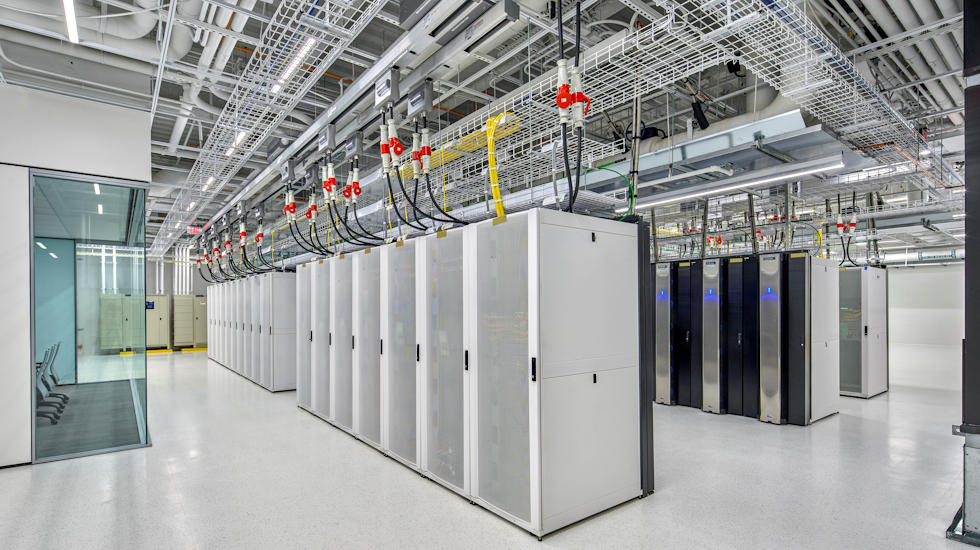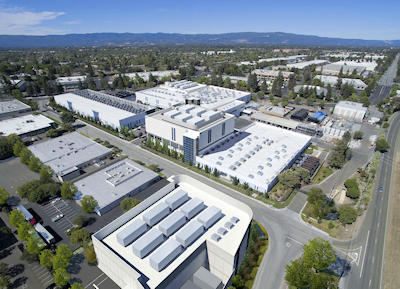The company has undergone significant change by selling its legacy real estate holdings and transforming into a pure-play digital infrastructure REIT.
DigitalBridge Group, Inc. (NYSE: DBRG) has undergone significant change since Marc Ganzi became president and CEO in July 2020 and began implementing the task of transforming the company into a pure-play digital infrastructure REIT.
In a breakneck capital deployment move, the company sold its legacy real estate holdings in hotels, offices, health care facilities, retail centers, and warehouses to exclusively focus on digital assets including cell towers, data centers, fiber, small cells, and edge infrastructure.
"New management has been in the chair now for six quarters," Ganzi, a member of the Nareit 2022 Advisory Board of Governors, says. "We've rotated $73 billion of assets, selling $40 billion of traditional real estate and building $33 billion in digital holdings. That's a pretty significant asset rotation."
DigitalBridge's current market value is around $5 billion, roughly double from a year ago. Under Ganzi's leadership, the company's share price has also more than tripled. For the third quarter of 2021, the company reported total consolidated revenues of $252 million, more than double the same period a year earlier.
DigitalBridge has also grown to $40 billion of digital assets under management, making it one of the world's largest dedicated digital infrastructure firms. As part of the pivot, Ganzi is aggressively competing to help build the nation's ultra-fast 5G wireless network, which will need vast amounts of new fiber and transmission infrastructure.
The company's shift in focus is opportune given that President Joe Biden signed a $1 trillion infrastructure spending bill into law in November. The bill designates $65 billion to expand the nation's broadband access—a priority during the pandemic when millions of Americans were forced to work and study from home, many without reliable internet access.
Ric Prentiss, managing director at Raymond James & Associates, says DigitalBridge's future could benefit from the infrastructure bill. "A lot of money is being raised that will help create digital infrastructure and build fiber deeper into the U.S. as well as nationwide 5G networks. That's going to be a decade-long path."
Prentiss believes investors will support DigitalBridge's transformation to a pure-play digital infrastructure REIT. "Private investors, pension funds, sovereign money get it," he notes. "They see that wireless towers, data centers, and other digital infrastructure are very long-lived assets with big-revenue contracts, and that they're absolutely essential for the world to be connected."
Also, when it comes to environmental, social, and governance (ESG) criteria that investors are looking for today, DigitalBridge "checks a lot of the social boxes of trying to make sure we bridge the digital divide," Prentiss adds.
Pandemic-Fueled Growth
Ganzi is no stranger when it comes to digital infrastructure. In 2003, he founded Global Tower Partners, one of the largest privately owned tower companies in the U.S. The company was acquired by American Tower Corp. (NYSE: AMT) in 2013 for $4.8 billion.
Ganzi went on to launch Digital Bridge Holdings LLC, which later merged with Colony Capital in July 2019 in a $325 million deal. He took over as CEO of the combined company in July 2020 to accelerate the digital transformation strategy, replacing long-time Colony CEO Thomas Barrack. Ganzi rebranded Colony to DigitalBridge in June 2021 to better reflect the new direction.
By the time of the rebranding, cloud-based computing platforms like Zoom, Microsoft Teams, Google Meet, and Amazon Web Services had all seen an explosion of growth. "These digital businesses just took off like a rocket ship, but what everybody forgets is that to make those things work you need the intrinsic plumbing behind it," Ganzi explains.
As capacity and demand increased during the pandemic, demand for DigitalBridge's data center leasing jumped more than 35%. Demand for space on its cell towers increased 12%, and demand for its fiber network rose nearly 20%.
"We had to build more cell towers and more data centers and dig more fiber out," Ganzi says. "All of these verticals were growing because it was this support system that enabled the world to stay functioning. It has been one of the fastest-growing moments in time for data centers, cell towers, fiber, and small-cell infrastructure."
Looking ahead, DigitalBridge sees a continuation of the vast opportunities in digital infrastructure driven by 5G technology, the Internet of Things (loT), cloud computing, artificial intelligence (AI), and edge computing.
Path to Pure Play
When Digital Bridge Holdings merged with Colony in 2019, Colony was a dividend-focused diversified REIT that lacked a strategic direction, Ganzi explains.
"It was very focused on delivering a high-performance dividend to shareholders but really didn't have a tremendous amount of growth," Ganzi says. It invested in real estate asset classes, many of which were suffering from disintermediation. "I knew that when we merged our businesses, we had a host of challenges ahead of us. And I took over right in the middle of the pandemic."
One of the biggest challenges was over-leverage. Ganzi inherited a balance sheet that was levered at about 14 times earnings before interest, taxes, depreciation, and amortization (EBITDA.) The company had a "pretty significant cost structure," he points out, with about $300 million of G&A costs on a global basis and 27 offices.
However, the company's digital business was growing about 30% per year. "On one hand, the pandemic was devastating to our hotels, office buildings, mortgage business, and wellness infrastructure business, which all suffered a systemic shock. But the digital infrastructure business was absolutely crushing it," Ganzi notes.
Asset by Asset
Ganzi forged ahead to transition DigitalBridge to a pure-play digital infrastructure REIT. Prior to the pandemic, the company had completed the sale of its industrial portfolio to Blackstone for $5.7 billion as part of its repositioning. Ganzi then mapped a two-year glide path to sell a total of $40 billion of real estate assets.
"That was hard," he admits. "Selling those assets in an up-market would have been great but selling hotels in the middle of a pandemic where occupancy plummeted to 25%, 30% was really difficult. To the credit of the team, we got it done."
Additionally, the company reached an agreement to sell a portfolio of other non-digital assets to Fortress Investment Group LLC for $3.2 billion and announced the $535 million sale of its wellness property portfolio to Highgate and Aurora Health Network. The deal is pending and includes $316 million of net value to DigitalBridge.
"That's really the last piece of the puzzle," Ganzi says. "We literally just went asset by asset and engaged appropriate resources and bankers and were able to divest what was formerly known as Colony Capital. Mission accomplished."
Dan Day, equity research analyst at B. Riley Securities, gives credit to Ganzi for selling traditional real estate during the pandemic. "They've done a great job managing this transition. All the big pieces are sold."
Simultaneously, DigitalBridge took measures to restore liquidity. "We knew we had to start paying off debt," Ganzi says. "I made a very difficult decision to suspend the dividend in the second quarter of 2020." (The dividend has yet to be restored, but Ganzi says he's committed to reinstating it in 2022)."I decided to harvest as much cash as I could," he notes. "I had to reconstitute our revolver [credit line] and start paying down debt." Ganzi has since taken net leverage down by reducing corporate debt from $7 billion to $1.4 billion.
Meanwhile, the company's cost structure needed to match the new mission. "We went from 500 employees to about 190, 27 offices to 11, and we cut the cost structure from $300 million a year to $130 million," Ganzi says. "We pulled about $170 million of annualized costs out of the business, which was a massive value uplift for shareholders."
In an effort to grow, DigitalBridge's investment management business has acquired more than a dozen companies including DataBank, Vantage Data Centers, fiber network operator Zayo Group Holdings, European data center company AtlasEdge Data Centres, and Vertical Bridge, the largest private owner/operator of communications infrastructure and locations in the U.S. "The ability to go out and buy and build next-generation real estate was a big prove it moment," Ganzi says.
Standing Apart
Meanwhile, DigitalBridge is busy raising massive amounts of capital. Its second flagship private equity fund, DCP II, has raised $8.1 billion, nearly doubling its first fund and 35% higher than the original $6 billion target. "DCP II blew away people's expectations," Day notes.
Yet despite this success, DigitalBridge is "still misunderstood and under the radar," Day says, given that it doesn't quite match the structure of other traditional digital infrastructure REITs.
For one, DigitalBridge not only owns, operates, and invests in digital infrastructure and real estate on its own behalf, but also operates an asset management business providing another source of revenue. It manages $17 billion of third-party capital in its investment management business.
"That's a differentiator from its peers," Day says. "They raise money from pension funds, endowments, and insurance companies, which love this space because it has a strong growth profile and provides current income."
DigitalBridge is also differentiated by the "hyper-convergence" trend, Day says. "Basically, it's all these assets— cell towers, data centers, fiber, small cells—starting to blend together."
DigitalBridge was assembled with that vision in mind, Day explains. "They're going to have all these different swim lanes and buy these different companies," he says. "They're going to operate independently, but they're all one family of companies, and there's a lot of synergies between them." DigitalBridge offers investors the ability to gain exposure across the entire digital infrastructure ecosystem. Day expects more investors to consider DigitalBridge as it becomes clear that the transformation is complete.
Rebuilding Trust
As a result of the extensive turnaround efforts, Ganzi says DigitalBridge has now reestablished trust with investors. "The only way you rebuild trust is you look people in the eye, tell them what you're going to do, and outperform that," Ganzi says. "We beat every key milestone and metric that we put in front of our shareholders."
Day describes 2021 as a "transformational year" for the company. "You can't say enough about the job that Ganzi and his team have done," he says, as the new CEO "has met every one of the targets he set."
Ganzi is also changing the company's culture with new company governance and a new senior leadership team. The company previously had no ESG policy and has now implemented forward-leaning ESG policies that tackle climate change. Ganzi also established new diversity, equity, and inclusion (DEI) initiatives. All of this is a proclamation, Ganzi says, that the company's transformation is complete.
"We want the investor community to know that we've arrived, and it wasn't easy, but we're happy to be on the other side," he says. "It's now a clean story. Investors appreciate clean, easy stories to digest."
And now that the foundational work is done, it's time to play offense. "We showed we can fix the business, the next stage is acceleration," Ganzi says.
Ganzi describes the REIT as "incredibly well-positioned," with a "clean balance sheet" and almost $2 billion in cash. "We're widely known as one of the most sophisticated investors in the digital infrastructure space. We think we can buy a lot of great digital real estate and continue to build out our digital operating model and the assets we own on the balance sheet," he adds.


